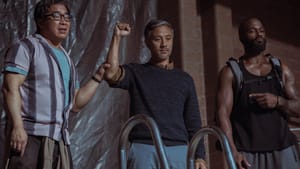Stay in the Loop
BSR publishes on a weekly schedule, with an email newsletter every Wednesday and Thursday morning. There’s no paywall, and subscribing is always free.
The Philadelphia Asian American Film Festival screens its 13th year

In a year that has shattered expectations and transformed our collective moviegoing experience, the Philadelphia Asian American Film Festival (PAAFF) brings an exciting slate of genre-defying delights for its 13th annual edition. The festival is entirely volunteer-driven and seeks to assemble a program reflective of the times we live in. This year’s collection is entirely online due to the pandemic, and it’s the first under new festival director Selena Yip. The festival runs November 5 through 15.
Leading undeterred
Yip is encouraged by the increased participation and accessibility a virtual festival presents. “Being online, with rental options, has greatly increased festival access to Philadelphians who are usually unable to attend our festival events due to things like lack of transportation, family responsibilities, or medical conditions,” she shared via email. “It's been really delightful for me to get texts from my closest friends telling me that this is the first year that they'll be able to participate and support because there's finally an option for them to tune in from the safety and comfort of their home.”
To help new and seasoned festival participants take advantage of PAAFF’s virtual programming, Yip has written a brief “How To Festival” guide. This year the festival has live performances, new and retrospective documentaries, creative discussions, and 13 shorts programs—the largest in the festival’s history.
“Every year, we receive hundreds of short film submissions and it always feels like we never have enough days in our festival to fit all of our favorite ones. Even with the increase in shorts programming we still feel this way, but I think short-form storytelling could really thrive in these new online conditions and I hope that folks will enjoy them as much as we enjoyed creatively curating them.”
Must-see streaming
This year’s opening night film The Paper Tigers is “a love letter to the journey of finding yourself, to friendship and family, to kung fu and kung fu masters,” Yip said. “It’s a story of conviction and constant growth that is deeply relatable.”
Following up with more similar themes, Everybody Was Kung Fu Fighting: The Global Impact of Martial Arts Films is a panel discussion that examines the influence of wuxia films on Asian and Black communities in America. Actor/director Jason Tobin (Better Luck Tomorrow), DJ and “Nostalgia King” Skeme Richards, and professor/writer TreaAndrea Russworm are featured on the panel.
From a Midwest City to Chinatown and Broadway: The Kim Loo Sisters is a creative presentation about the Kim Loo Sisters (or “Kimmies”), who broke the ceiling and performed with big names like Frank Sinatra, The Three Stooges, Ann Miller, and Jackie Gleason.
Live panel Seeing Ourselves in Asian American Cinema and Media with Eric Hung and Irene Chien will invite movie buffs and students alike to engage with a new perspective on Asian American history and media representation.
Queer Futures: LGBTQ Shorts features anti-tragedies, puppets, and mysterious spirits in a 60-minute block of narrative and documentary stories. Shorts program Excavated Memories includes stories of resilience from a Japanese American concentration camp survivor and a family-owned restaurant in Little Tokyo during the late 1970s when punk was thriving in LA.
Centerpiece narrative Goodbye Mother tells the story of an estranged son returning home to Vietnam after nine years, trying to find the right moment to reveal that his traveling companion Ian is actually his partner.
What, When, Where, and Accessibility:
The 13th Annual Philadelphia Asian American Film Festival takes place virtually November 5-15, 2020. To view the full festival program and purchase tickets, visit PAAFF online.
Image description: Three men, two Asian and one Black, stand together. The Asian man to the left holds the right arm of the Asian man in the middle, whose fist is rounded and held up in the air. The Black man points to the man in the center.
Sign up for our newsletter
All of the week's new articles, all in one place. Sign up for the free weekly BSR newsletters, and don't miss a conversation.

 Marta Rusek
Marta Rusek